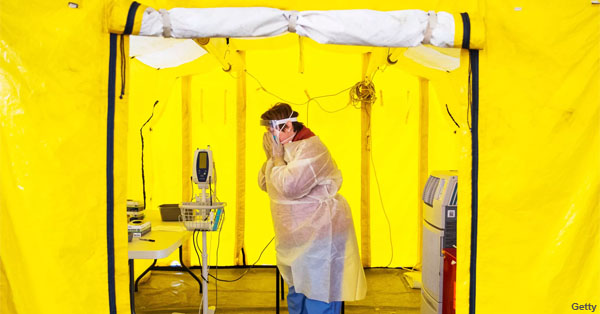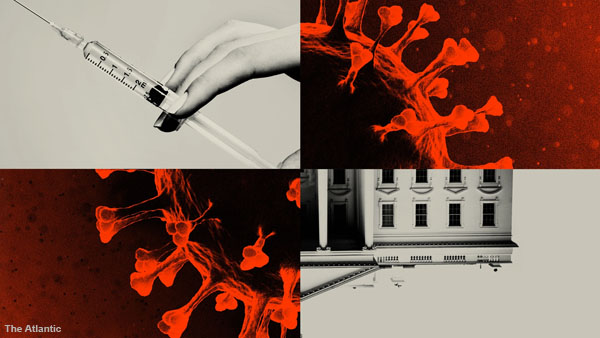NEWS ROUNDUP
Construction clarification ● Grocery stores hiring ● How this will end
Thursday, March 26, 2020
THIS WASHINGTON
► LIVE from the Seattle Times — Coronavirus daily news update, March 26 — The state Department of Health announced 111 new cases Tuesday, bringing the state total to 2,580 cases, including 132 deaths. The bulk of cases remain in King County.
► In the Seattle Times — New Inslee edict: Most construction work is not authorized during coronavirus shutdown — In a major clarification to the statewide stay-at-home order, Gov. Jay Inslee’s office said workers on most commercial and residential construction sites should stay home to combat the spread of the novel coronavirus. Nearly all construction is a nonessential activity under the state’s order, according to a memo issued by the governor’s office. The clarification is sure to frustrate some construction industry leaders who have insisted they are essential businesses allowed to continue operating. Many construction workers concerned about conditions on their job sites may be gratified by the clarification.
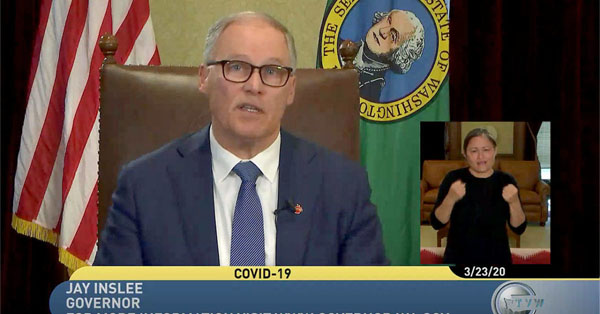
► In the Tri-City Herald — If you want your life back, follow Inslee’s coronavirus stay home order (editorial) — At this point, every one of us must consider ourselves a “spreader” even if we have no symptoms. That’s the only attitude that will help slow this disease. Regrettably, there may still be people who do not comprehend the severity of the situation, or if they do, they don’t care enough to change their habits. And their disregard for temporary rules will mean our lives, our economy and our children’s education will be disrupted for months instead of weeks. Worst of all, it will mean more people will become sick and more people will die.
 ► From the Public News Service — In pandemic, workers question safety at Western State Hospital — Some workers at Washington state’s psychiatric facility near Tacoma are growing increasingly concerned about the health of patients and themselves during the novel coronavirus outbreak. Mike Yestramski, a psychiatric social worker at Western State Hospital and president of the Washington Federation of State Employees, says the hospital staff is scared and doesn’t feel there’s enough transparency from managers about how they’re keeping people safe. “We actually had a nurse who was working with the patient who tested positive — called in, was describing her symptoms and was told to come in anyway,” he relates. “Thankfully, she refused.”
► From the Public News Service — In pandemic, workers question safety at Western State Hospital — Some workers at Washington state’s psychiatric facility near Tacoma are growing increasingly concerned about the health of patients and themselves during the novel coronavirus outbreak. Mike Yestramski, a psychiatric social worker at Western State Hospital and president of the Washington Federation of State Employees, says the hospital staff is scared and doesn’t feel there’s enough transparency from managers about how they’re keeping people safe. “We actually had a nurse who was working with the patient who tested positive — called in, was describing her symptoms and was told to come in anyway,” he relates. “Thankfully, she refused.”
► From DSHS — Total of five staff have now tested positive for COVID-19 at Western State Hospital — There are now a total of two patients and five staff members who have tested positive for the virus.
► In the Seattle Times — School in Washington is supposed to resume (remotely) by Monday. Will it? — The deadline is nearly here: Washington schools have two business days to figure out how they intend to teach the state’s roughly 1.1 million students remotely. School districts are hurrying to get something – anything – prepared to satisfy state education department’s recent instructions to begin remote instruction by Monday.
► From KNKX — Hundreds of child care centers close down amid the coronavirus outbreak — Inslee has emphasized the need for child care to enable parents in medical or first-responder professions to continue to work. He’s designated child care workers as essential to critical infrastructure. But advocacy groups say child care centers are in crisis and the government needs to step up to help them in this difficult time.
► In the Olympian — What happens when state’s eviction moratorium ends? — Tenants and landlords are questioning what will happen when a statewide moratorium on evictions for non-payment of rent ends. Gov. Jay Inslee announced the 30-day moratorium on March 18. He may extend it for another month.
► From TPM — Washington has an innovative way to fund its COVID response – if it can get Trump’s OK — Washington state petitioned the Trump administration for a nearly unprecedented change to its Medicaid program, to allow the state create a COVID-19 Disaster Relief Fund, allowing private philanthropists and local governments to finance much-needed emergency services targeted at getting control of the pandemic.
LOCAL
► From KING — These jobs are hiring amid the coronavirus crisis in Washington
The Stand (March 17) — Amid crisis, thousands of good union jobs available in state
► In the (Everett) Herald — 5 more Community Transit workers test positive for COVID-19 — Fewer buses are running as at least nine transit employees have tested positive in Snohomish County.
► In the Bellingham Herald — Bellingham hospital reports staff, supply resources ‘adequate’ to battle coronavirus — “Several” PeaceHealth caregivers at Bellingham’s St. Joseph hospital and at Whatcom County clinics have been diagnosed with COVID-19, a hospital official said, but none were exposed through their work with patients and illnesses haven’t hurt staffing levels.
► In the Bellingham Herald — Intalco announces that Ferndale employee tests positive for coronavirus — The Ferndale aluminum smelter is the only one operating in Washington state and employed approximately 700 people in 2019. It is part of the Critical Manufacturing Section, so it will continue operating during Gov. Jay Inslee’s “Stay Home, Stay Healthy” order.
► In the Seattle Times — Fix the systems that failed Hanford workers (editorial) — A Hanford cleanup contractor’s mistreatment of workers who were issued faulty equipment highlights multiple problems that regulators should address. Safety lapses at the southeast Washington nuclear site carry potential consequences too dire to treat lightly.
BOEING
► From IAM 751 — Q&A for members regarding Boeing’s temporary shutdown
► From SPEEA —SPEEA available during work disruptions

► From Reuters — Exclusive: Boeing plans 737 MAX production restart by May — Boeing’s planning hinges on the scale of disruptions from the fast spreading coronavirus, and U.S. regulators clearing the 737 MAX to return to service. One industry source said Boeing has asked some suppliers to be ready to ship 737 parts in April. Another person said production was planned to restart in May. A third person said coronavirus is throwing a wrench in Boeing’s plans – they had initially hoped for April, but that fell to May.
► In the Washington Post — Senate aid package quietly carves out billions intended for Boeing, officials say — The Senate package includes a $17 billion federal loan program for businesses deemed “critical to maintaining national security.” The provision does not mention Boeing by name but was crafted largely for the company’s benefit.
► In the Seattle Times — Cantwell: Boeing may not like strings attached to U.S. help for aviation in coronavirus crisis — Sen. Maria Cantwell expressed doubt that Boeing will accept the direct government loans it offers. The bill has specific limitations on executive pay, on payments to shareholders, and on share buybacks. And the loans it offers require the government receive warrants, which are options to buy stock.
► In the (Everett) Herald — Inslee signs the law repealing a Boeing tax break — Boeing asked lawmakers to erase its preferential business-and-occupation tax rate, which the WTO deemed an illegal subsidy. Under the new law, the tax rate for Boeing and the rest of the aerospace industry could be lowered slightly — though not as low as it is today — if the U.S. and the EU enter into a written agreement resolving any WTO disputes. But in that case, the new law also requires Boeing to employ a minimum percentage of apprentices as part of its workforce.
The Stand (March 2) — ‘Snapback’ tax incentives for Boeing need accountability
THAT WASHINGTON
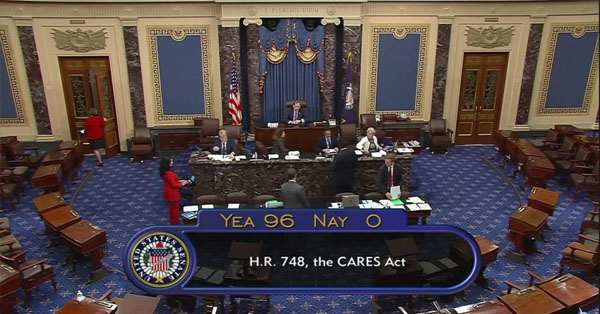
► In the Washington Post — Senate passes $2 trillion bill to blunt coronavirus pandemic’s economic impact, as households and businesses gasp for relief — The sprawling legislation, which passed 96 to 0, would send checks to more than 150 million American households, set up enormous loan programs for businesses large and small, pump billions of dollars into unemployment insurance programs, greatly boost spending on hospitals, and much more.
► From CBS News — Pelosi: House will take up coronavirus relief bill on Friday
ALSO TODAY at The Stand — AFL-CIO to Congress: Pass this bill, then do much more
► From The Hill — Senate rejects GOP attempt to change unemployment benefits in coronavirus stimulus bill — Four Republican senators tried to cap unemployment benefits, but senators voted 48-48 against their amendment. Sixty votes were required for the amendment to pass.
 ► In the NY Times — A cruel motive for a costly delay (editorial) — How could it be that any senator did not grasp the urgency of this moment in American history? How could it be that any senator would threaten further delays to prevent a few thousand workers from getting a few hundred dollars in extra aid?
► In the NY Times — A cruel motive for a costly delay (editorial) — How could it be that any senator did not grasp the urgency of this moment in American history? How could it be that any senator would threaten further delays to prevent a few thousand workers from getting a few hundred dollars in extra aid?
► From The Hill — Questions and answers on coronavirus relief checks
► From The Hill — Washington state radio station won’t air Trump briefings because of ‘false or misleading information’ — A public radio station in Washington state, KUOW, will no longer be airing White House press briefings on the coronavirus “due to a pattern of false or misleading information provided that cannot be fact checked in real time.”
Which brings us to this, from NBC News — Trump Cabinet’s Bible teacher says gays cause ‘God’s wrath’ in COVID-19 blog post — Environmentalists and people with “depraved minds” are also igniting “God’s wrath,” according to the Rev. Ralph Drollinger.
NATIONAL
► From CNBC — Jobless claims soar past 3 million to record high — Americans displaced by the coronavirus crisis filed unemployment claims in record numbers, with the Labor Department reporting Thursday a surge to 3.28 million. The number shatters the Great Recession peak of 665,000 in March 2009 and the all-time mark of 695,000 in October 1982. The previous week, which reflected the period before the worst of the coronavirus hit, was just 282,000.
ALSO at The Stand — Applying for unemployment benefits in Washington — Check out the latest emergency rule changes regarding eligibility.
► From Vox — The next coronavirus crisis will be a shortage of doctors and nurses — Doctors and nurses are reporting gear shortages, lax protocols, and a high level of stress in their workplaces — with the worst still to come. Some of them told Vox that they consider getting infected with the coronavirus an inevitability.
► In the Washington Post — Some health-care workers resist orders to work without adequate protection — To do so, they must buck the pandemic’s all-hands-on-deck ethos, the medical tradition of accepting elevated risk in a crisis and the threat of discipline from employers.
► In the Orlando Weekly — Amid coronavirus uncertainties, hospitality workers look to labor unions — With continued ambiguity and confusion, Orlando’s hospitality industry workers are talking more about unions. From having workers clean a restaurant only to then lay them off to having workers of multi-billion-dollar companies worried about their next paycheck, workers across the region are now facing uncertainty like never before.
EDITOR’S NOTE — But with the NLRB’s anti-union undemocratic decision to unilaterally cancel all union recognition elections — including all-mail elections — American workers are being muzzled at a time they desperately need a voice.
► From Reuters — New CEO pay limits loom as investors confront coronavirus crisis — The havoc wrought by the coronavirus crisis could give investors leverage to put new limits on CEO pay packages and link them more closely to a range of social and environmental issues at companies’ annual meetings this spring.
► THANK YOU TO THE HEROES…
This photo was taken by an ER nurse in Morristown, NJ and I just can’t. pic.twitter.com/vYjCtlsYji
— Harlan Coben (@HarlanCoben) March 25, 2020
TODAY’S MUST-READ
► Long, but important… from The Atlantic — How the pandemic will end (by Ed Yong) — Rudderless, blindsided, lethargic, and uncoordinated, America has mishandled the COVID-19 crisis to a substantially worse degree than what every health expert I’ve spoken with had feared. Having fallen behind, it will be difficult — but not impossible — for the United States to catch up… A study released by a team at Imperial College London concluded that if the pandemic is left unchecked, U.S. hospital beds will all be full by late April. By the end of June, for every available critical-care bed, there will be roughly 15 COVID-19 patients in need of one. By the end of the summer, the pandemic will have directly killed 2.2 million Americans, notwithstanding those who will indirectly die as hospitals are unable to care for the usual slew of heart attacks, strokes, and car accidents. This is the worst-case scenario. To avert it, four things need to happen — and quickly.
The first and most important is to rapidly produce masks, gloves, and other personal protective equipment. If health-care workers can’t stay healthy, the rest of the response will collapse. Trump could use that time to invoke the Defense Production Act, launching a wartime effort in which American manufacturers switch to making medical equipment. But after invoking the act last Wednesday, Trump has failed to actually use it, reportedly due to lobbying from the U.S. Chamber of Commerce and heads of major corporations. The second pressing need: a massive rollout of COVID-19 tests. The third need: social distancing. In these moments, when the good of all hinges on the sacrifices of many, clear coordination matters — the fourth urgent need. The importance of social distancing must be impressed upon a public who must also be reassured and informed.
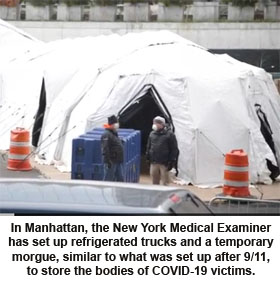 There are three possible endgames: one that’s very unlikely, one that’s very dangerous, and one that’s very long. The first is that every nation manages to simultaneously bring the virus to heel. Given how widespread the coronavirus pandemic is, and how badly many countries are faring, the odds of worldwide synchronous control seem vanishingly small. The second is that the virus does what past flu pandemics have done: It burns through the world and leaves behind enough immune survivors that it eventually struggles to find viable hosts. This “herd immunity” scenario would be quick, and thus tempting. But it would also come at a terrible cost: likely leaving behind many millions of corpses and a trail of devastated health systems. (EDITOR’S NOTE — This is what Trump, Fox News and other right-wingers appear to prefer, given their calls to “reopen the economy” and relax/abandon stay-home orders.) The third scenario is that the world plays a protracted game of whack-a-mole with the virus, stamping out outbreaks here and there until a vaccine can be produced. This is the best option, but also the longest and most complicated.
There are three possible endgames: one that’s very unlikely, one that’s very dangerous, and one that’s very long. The first is that every nation manages to simultaneously bring the virus to heel. Given how widespread the coronavirus pandemic is, and how badly many countries are faring, the odds of worldwide synchronous control seem vanishingly small. The second is that the virus does what past flu pandemics have done: It burns through the world and leaves behind enough immune survivors that it eventually struggles to find viable hosts. This “herd immunity” scenario would be quick, and thus tempting. But it would also come at a terrible cost: likely leaving behind many millions of corpses and a trail of devastated health systems. (EDITOR’S NOTE — This is what Trump, Fox News and other right-wingers appear to prefer, given their calls to “reopen the economy” and relax/abandon stay-home orders.) The third scenario is that the world plays a protracted game of whack-a-mole with the virus, stamping out outbreaks here and there until a vaccine can be produced. This is the best option, but also the longest and most complicated.
It’s likely that the new coronavirus will be a lingering part of American life for at least a year, if not much longer… Much about the coming years, including the frequency, duration, and timing of social upheavals, depends on two properties of the virus, both of which are currently unknown. First: seasonality. Second: duration of immunity. … Whether through accumulating herd immunity or the long-awaited arrival of a vaccine, the virus will find spreading explosively more and more difficult. But it’s unlikely to disappear entirely… The lessons that America draws from this experience are hard to predict, especially at a time when online algorithms and partisan broadcasters only serve news that aligns with their audience’s preconceptions.
The Stand posts links to Washington state and national news of interest every weekday morning by 10 a.m.

